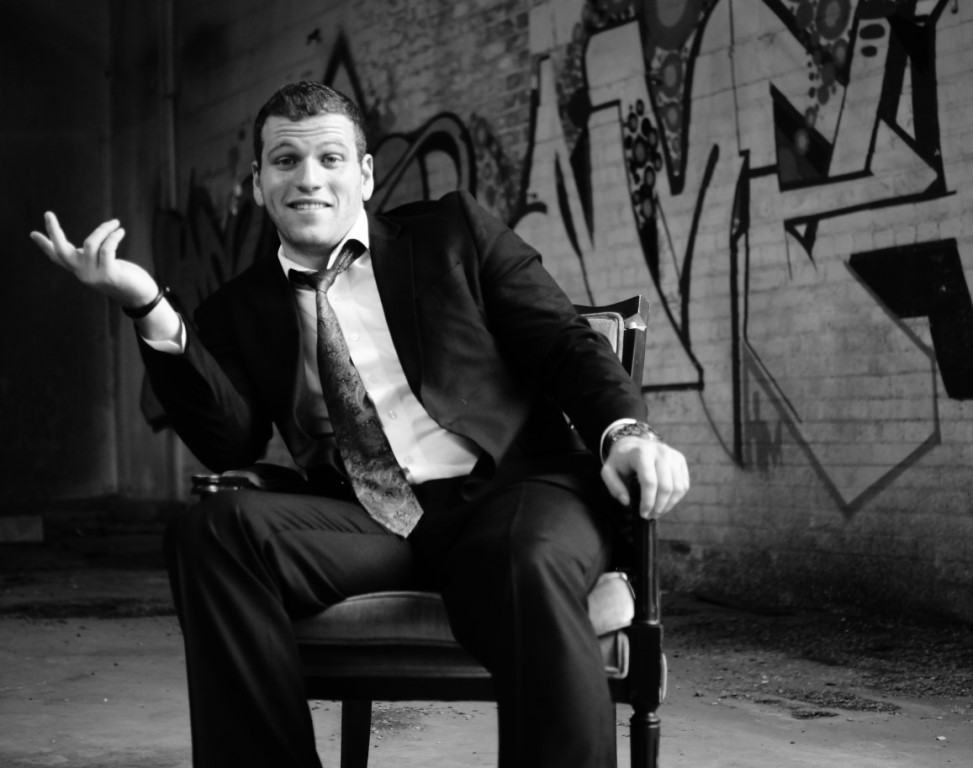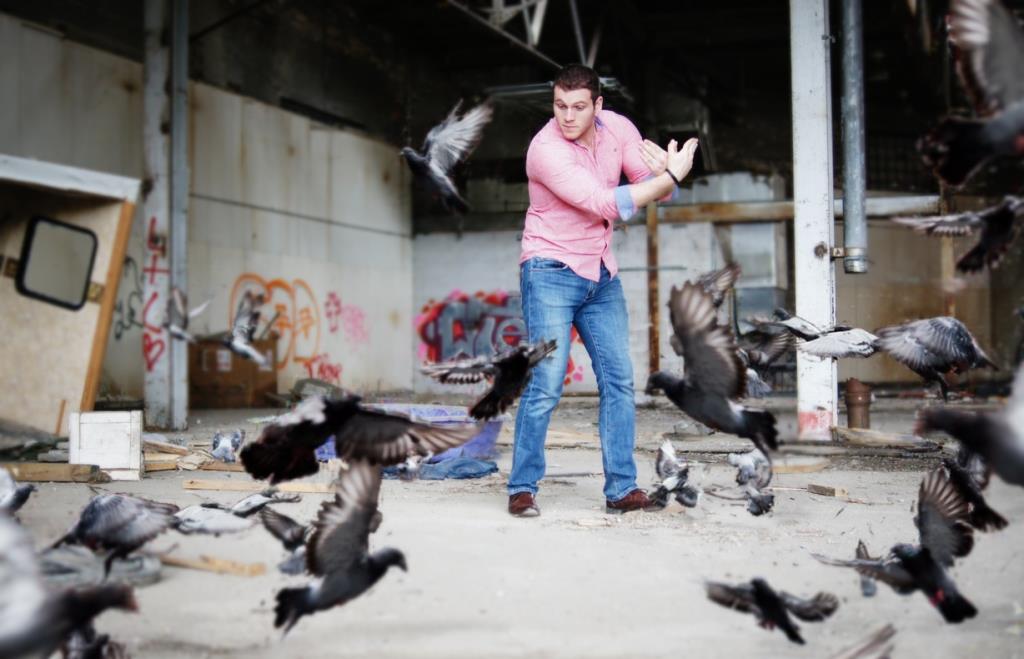Making It: Actor/Comic Greg Berman
Rob Callahan's new series for Mn Artists takes a long view on the lifelong hustle of a creative career, featuring interviews with artists in a range of disciplines who've already lived through a big break (or two) and are in the thick of the work toward all that comes next

“The hardest thing is I can’t control it,” says Greg Berman, reflecting on the often fickle and fleeting nature of success as an artist. “I don’t get to control what parts I get, I only get to audition.”
Even getting an audition can be out of his hands, though, and the young actor/comic estimates that only about ten percent of his auditions end in a call back, much less paid work. “The thing is, I think I’m doing okay, but it doesn’t feel like that, because I hear no so much more than I hear yes.” And filling time between the ‘yes’ answers isn’t often easy. For a start, that space is taken up with branding, promotion, chasing new gigs, and honing the craft. There is always the mundane but no less important stuff, too, like family and work. If you’re like most performing artists, you balance your artistic successes against your social ones. You live two lives, and you try to keep them playing nice.
Berman heard a big ‘yes’ in September, after a last minute audition landed him in a two-episode role as the criminal John Lee Radigan on the NBC crime drama, Chicago P.D. “It was awesome,” he says, excitedly remembering the role that came complete with a climactic action-packed car chase at the end. “I don’t know if they’re going to bring me back or not. I mean, I’m the bad guy, so I got thrown in jail, but I didn’t die.” While Berman hasn’t heard anything yet, he hasn’t ruled out a return and is still “kind of waiting by the phone to see.”
Berman’s story isn’t unique. In fact, it’s such a familiar tale that Mn Artists is beginning a series on artists who’ve had their big break (possibly even a few big breaks) only to find themselves still on the road to making it, still aiming for the break that’s just out of reach, that proverbial next big thing that’ll really land them somewhere solid. Hitting it big today doesn’t necessarily mean you can sit back and relax. Often, it just means you’re under pressure to hit it bigger tomorrow.
“Once you do a show like that, and you watch it, and then it’s over, there’s a really weird feeling of ‘is that it?'” After the anticipation built up in the weeks leading to the broadcast, Berman says he suddenly realized the show was over, and there he was again, asking himself that familiar question: “Is this my peak? Am I going to get anything else?”
What Have You Done for Me Lately?
“Everything I do and everything I put out speaks to who I am as a performer and a comic,” says Berman, who is following up on the opportunities of last year by trying to keep his momentum going. Now a member of the Screen Actors Guild, he was soon hit with a wave of anxiety over how not to slow down and stop. “How do I make sure that people know that I did this,” he asks, “enough that they book me for something?”
“If you let too much time pass, it’s like, ‘Yeah a year ago I did this show, do you remember?’“ If you let too much time pass, the answer is likely ‘no.’
So, Berman says he’s been sending emails to comedy club bookers, letting them know about his new television credit on a major network. Some clubs may not even notice, but for others it may affect they way they bill him. “In a smaller club, they can bill that as a bigger act,” he says. “I’m the guy that was on Chicago P.D.”
Outside of being that guy, Berman keeps things going by spreading himself out over a handful of projects. He collaborates on a half-hour television show ostensibly titled The Alex Aaron Comedy Hour, writing and acting in ‘long form short films’ loosely connected within a framework of running gags and absurdist comedy. “It’s a great way to do something collaborative that I am not running,” he says. “I get to be creative, have a lot of freedom to do some cool stuff, but not have to worry about the logistics part of it.”
In addition, he works with producer Wendy Runge on Genuine Hero, a developing video series spotlighting role models who change lives and empower others in the real world.
Not one to shy away from new media, he’s also launched a project called Tell My Story, in which he crafts fictional stories about people’s lives, based on his impressions of their instagram feeds.
The game is simple. You will post a picture of yourself, holding up a sign/piece of paper/anything that says “Tell My Story”, tag me (@bermancomedy) in the picture, and in the caption write your name and country/state of origin. I will go through all of the pictures leading up to that one and I will write a story about your life ONLY based on the images in your Instagram.
He explains, “It kind of means to answer the question, what does your instagram account look like to someone that doesn’t know you?”

Don’t Quit Your Day Job. Or Do…
Artists and day jobs often go together like oil and water. Most artists have them. Many hate them, because a 40-hour week spent surrounded by pastel button-downs and dead-inside smiles is enough to grate on anyone, but when coworkers find out you’re a working artist, they can just make your work day intolerable. Hands up, anyone who’s ever fielded the question: “If you were any good at art, you wouldn’t have to work, would you?”
For Berman, juggling the two has been a mixed experience. “I don’t think like a lot of my co-workers do and, to be honest, they always found it amusing,” he says. “They enjoyed hearing stories from my time on set or on stage. They celebrated my accomplishments with me and were always quick to give me advice and help any way they could. At least, the people who were close to me and knew me were like that. The people who didn’t know me all that well kept me at arm’s length, because they didn’t understand me… and thus I was a threat.”
“My manager went to bat for me,” he recalls of a time he asked to work remotely, so he could pursue an opportunity in Los Angeles. In a business where several of his coworkers already telecommute from other states, Berman thought it a reasonable request. However, other managers – who placed him more firmly on the threat end of the spectrum – seemed glad for a chance to be rid of him. “They ended up barking louder than others, and my request was denied.”
When faced with the recent opportunity to prove his chops to Los Angeles, Berman said no at first. He soon reconsidered, though. Although he’s leaving some stability behind, he says he’s willing to assume the risks you take as an aspiring artist. “I realized that the only reason I was saying no was because of my own fear: fear that I didn’t have a job out there yet, fear that it wouldn’t work,” he recalls. “And I realized that if that fear is keeping me from doing it now, then it will continue to keep me from moving to LA later. I will always be able to come up with excuses for why I’m not ready.”
So, he decided that he wouldn’t make an excuse this time. Citing the adage, “Luck is when preparation meets opportunity,” he took stock of all the preparing he’d done and started making plans for a big move out West, which he’ll make this January.
His experience thus far has left him dwelling on his work situation, and thinking deeply about advice he could glean from it for others: “The message I want to send to all employers out there who are hiring someone like me, who has a passion outside of work, is we want to make it work! We will do our best to make it work. We need the job, and want to excel to keep it.” And, to those in the same situation he found himself, he adds: “To anyone who is scared to start something while having a full-time job, my advice is to do it…. There is no reason it can’t work, and there are managers out there who understand us.”